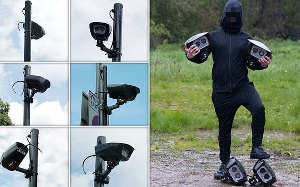Navigating Challenges Around The Ultra-Low Emission Zone Expansion

In recent months, the expansion of London’s Ultra Low Emission Zone (ULEZ) has impacted all road users, including the motor trade industry.
It has sparked both environmental optimism and vehicular discontent. As the boundaries widened to encompass all of Greater London, a surge in criminal activities targeting ULEZ cameras has been recorded.
This unsettling trend, however, is just one facet of the ongoing changes in the city’s efforts to combat air pollution and promote cleaner transportation.
ULEZ Security Challenges
The Metropolitan Police reported a significant rise in crimes related to ULEZ cameras, with 987 cameras targeted by activists in the past seven months.
Disturbingly, 220 cameras were stolen, and 767 were damaged, rendering them incapable of capturing images.
Acts of vandalism ranged from spray painting to ripping out wiring, reflecting drivers’ frustration affected by the expansion.
Response and Enforcement
To counteract these criminal acts, the police have heightened their presence, deploying vans equipped with automatic number plate recognition (ANPR) across London.
Now donning balaclavas and concealing their identities, officers have encountered clashes with activists challenging the ULEZ scheme.
The enforcement measures include fines of up to £250 for drivers failing to meet emission standards, with a reduced penalty of £90 if paid within two weeks.
There are no penalty points, so you should not contact your local insurance broker about your policy if fined.
A Scotland Yard spokesperson recently stated: “The Met continues to treat criminal activity concerning ULEZ seriously and has deployed considerable resources to our operation.
“Where there are possible lines of enquiry, local investigators will follow up using a range of investigative approaches, including CCTV trawls, witness searches and an assessment of forensic opportunities.”
Beyond ULEZ
Multiple councils across the UK are now adopting Ultra Low Emissions Parking (ULEP) fees to discourage older petrol and diesel vehicles further.
In the City of London, emissions-based parking fees have been in effect since 2018, with electric, hydrogen, or hybrid vehicles charged £5 per hour, petrol vehicles from 2005 paying £7.20, and diesel vehicles from 2015 paying £10 per hour.
One Borough, Merton, is considering a diesel surcharge adding to the day-to-day motoring costs for residents and visitors who already fork out for motor insurance and road tax.
London Variances
Various London boroughs have implemented their own ULEP fees, affecting residents and visitors differently.
Haringey imposes an annual fee of £80 for diesel car owners, while Lambeth introduces hourly surcharges ranging from £1.97 to £4.41 on top of regular parking fees.
Lewisham differentiates between EVs, petrol cars, and diesel vehicles, each incurring varying hourly charges.
Kensington and Chelsea also vary charges based on vehicle type, while Bromley confirms no charges based on emission standards.

Beyond London
Beyond the capital, Bath has introduced similar schemes in eight council-owned car parks, exemplifying the nationwide debate surrounding environmental initiatives versus perceived encroachments on motorists.
Conclusion
As cities grapple with air quality concerns, the ULEZ expansion and related parking schemes represent challenges and opportunities.
While these measures aim to create a more environmentally friendly future, they have sparked a divisive debate within the motor trade industry and amongst advocates and critics, highlighting the need for a nuanced approach to balancing environmental goals with the practicalities of daily life.






